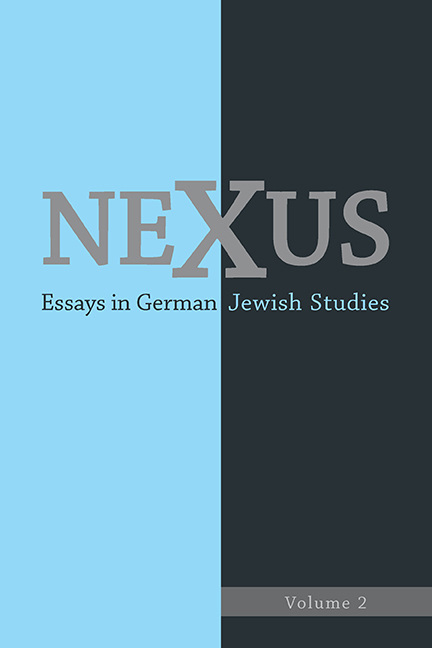Book contents
- Frontmatter
- Dedication
- Contents
- Acknowledgments
- Introduction
- Nexus Forum
- Introduction to the Nexus Forum A Most Unwanted Man: Hans-Joachim Schoeps
- Jew, Prussian, German: The Adventuresome Story of Hans-Joachim Schoeps
- Hans-Joachim Schoeps: Contrarian Scholar
- The Meyerowitz Family from Königsberg: Contemporaries of Hans-Joachim Schoeps
- From the Margins: A Response to Schoeps on Schoeps
- A Conservative Christian Welcome: A Response to Julius Schoeps
- Facing His Nazi Past? A Response to Schoeps on Schoeps
- Setting the Record Straight Regarding The Protocols of the Elders of Zion: A Fool's Errand?
- A Discussion of the “German” Dimension of Reform Judaism in Select Congregations in Three American Southern States, 1860–1880
- Weimar on Broadway: Fritz Kortner and Dorothy Thompson's Refugee Play Another Sun
- If I forget thee, O Jerusalem: The Jewish Exilic Mind in Else Lasker-Schüler's IchundIch
- “Seit ein Gespräch wir sind und hören können von einander”: Martin Buber's Message to Postwar Germany
- Hungerkünstler: George Tabori Directs Kafka in Bremen (1977)
Performing the Jew in Austria after Waldheim: Robert Menasse's Die Vertreibung aus der Hölle
from Nexus Forum
Published online by Cambridge University Press: 15 March 2018
- Frontmatter
- Dedication
- Contents
- Acknowledgments
- Introduction
- Nexus Forum
- Introduction to the Nexus Forum A Most Unwanted Man: Hans-Joachim Schoeps
- Jew, Prussian, German: The Adventuresome Story of Hans-Joachim Schoeps
- Hans-Joachim Schoeps: Contrarian Scholar
- The Meyerowitz Family from Königsberg: Contemporaries of Hans-Joachim Schoeps
- From the Margins: A Response to Schoeps on Schoeps
- A Conservative Christian Welcome: A Response to Julius Schoeps
- Facing His Nazi Past? A Response to Schoeps on Schoeps
- Setting the Record Straight Regarding The Protocols of the Elders of Zion: A Fool's Errand?
- A Discussion of the “German” Dimension of Reform Judaism in Select Congregations in Three American Southern States, 1860–1880
- Weimar on Broadway: Fritz Kortner and Dorothy Thompson's Refugee Play Another Sun
- If I forget thee, O Jerusalem: The Jewish Exilic Mind in Else Lasker-Schüler's IchundIch
- “Seit ein Gespräch wir sind und hören können von einander”: Martin Buber's Message to Postwar Germany
- Hungerkünstler: George Tabori Directs Kafka in Bremen (1977)
Summary
Robert Menasse is one of a number of Jewish writers who have gained prominence in Austria since the so-called Waldheim affair in 1986. While Jewishness had played a more tangential role in his earlier fiction, the semi-autobiographical novel Die Vertreibung aus der Hölle (Expulsion from Hell, 2001) celebrates Menasse's “coming out” as a Jew. This essay offers a reading of the novel, and positions it in the context of the political culture in post-Waldheim Austria. By drawing on some of Menasse's nonfictional texts and on an interview conducted with him by the author, this essay also outlines the development of Menasse both as a public figure and as a Jewish author.
SINCE THE SO-CALLED WALDHEIM AFFAIR in 1986, a number of Jewish writers have gained prominence in the Austrian public sphere. Apart from contributing in a significant way to contemporary Austrian literature, many of them have also played a central role in shaping political culture in Austria over the past quarter century. One of the most prominent figures among them is Robert Menasse. Menasse was born in 1954 to a Jewish father who survived the Nazi period in Great Britain, and Jewish refugees play an important role in his early work. His 2001 novel Die Vertreibung aus der Hölle calls the reader to witness the principal character as he discovers his Jewishness and develops a Jewish identity. In this essay, I will discuss Menasse's novel as an example of both the new Jewish literary discourse in Austria in response to Waldheim and of Menasse's own development as a Jewish author.
Die Vertreibung aus der Hölle, set in the late 1990s, opens with a school reunion in a Viennese restaurant. The first impression the reader gets of Viktor Abravanel is more that of an antagonist than of a protagonist: instead of informing the party about his own career since leaving school, he discloses the hidden past of the class's teachers by accusing them of having been members of the NSDAP. He justifies his action by arguing:
Ich finde, um zu verstehen, was ein Mensch geworden ist, kann es auch sehr lohnend, sehr erhellend sein, zu fragen: Wer waren seine Lehrer?
(VH 20)[I find that in order to understand what a person has become, it is also very worthwhile, very illuminating, to ask: Who were his teachers?]
- Type
- Chapter
- Information
- NexusEssays in German Jewish Studies, pp. 173 - 190Publisher: Boydell & BrewerPrint publication year: 2013



